Live on the homepage now!
Reader Supported News
The lackluster attendance may be connected to conspiracy theories that the event was a “false flag” or “honeypot” for federal agents to entrap and arrest attendees
Reports from the start of the “Justice for J6” rally Saturday show an event much smaller than the January 6th Capitol insurrection. Video from on-scene reporters appears to show more members of the media in attendance than Trump-supporting protesters. Although Capitol Police expected as many as 1,000 attendees, and organizers obtained permits for a group of 700, the final turnout looks like it will be much lower, according to reports on the ground.
The rally is organized by a nonprofit, “Look Ahead America,” that is led by a former Trump campaign aid Matt Braynard. The group’s mission is “standing up for patriotic Americans who have been forgotten by our government,” according to its website, which means “training citizens to lobby their state and local governments for America First causes” in addition to “ensuring voter integrity.” Because of the event’s connection to January 6th, the FBI warned that attendees “may seek to engage in violence” but said there were no indications of a “specific or credible plot associated with the event.”
The lack of attendance could be connected with conspiracy theories about the rally pushed by Trump and other right-wingers. Users on extremist forums on platforms like TheDonald and 4chan, NBC News reported, were warning potential attendees that they believed the event was a “false flag” or “honeypot” where federal agents will entrap Trump supporters into committing violence.
In an interview with The Federalist on Thursday, the former president echoed conspiracy theories that the event was a “setup.” “On Saturday, that’s a setup,” Trump said. “If people don’t show up they’ll say, ‘Oh, it’s a lack of spirit.’ And if people do show up they’ll be harassed.”
But immediately afterward, the former president also issued a statement saying: “Our hearts and minds are with the people being persecuted so unfairly relating to the January 6th protest concerning the Rigged Presidential Election. In addition to everything else, it has proven conclusively that we are a two-tiered system of justice. In the end, however, JUSTICE WILL PREVAIL!”
It’s probable that Trump was covering his ass here, setting himself up for credit had turnout been huge while also being able to distance himself from the event in case it fails. After all, few things are more Trumpian than taking credit for others’ success and refusing accountability for his own failures.
According to Capitol Police, approximately 400 to 450 people, including the media, were inside the protest area during today’s event.
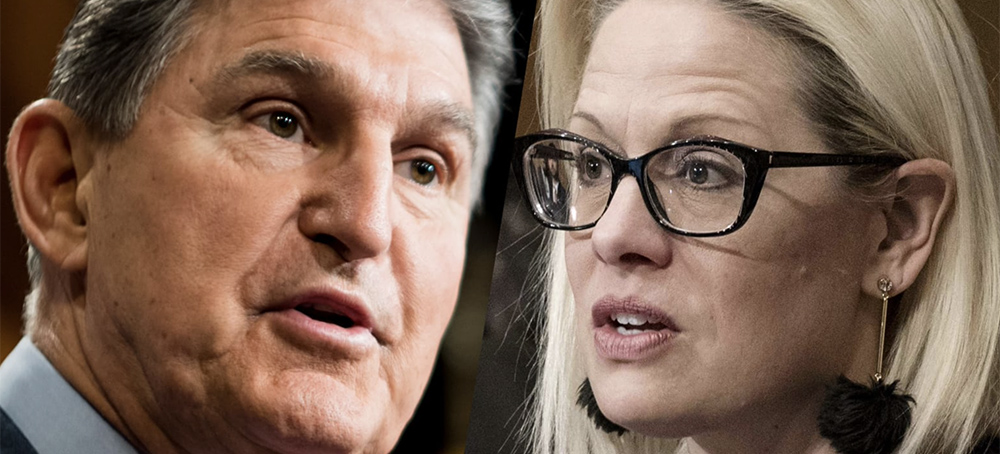 Senators Manchin and Sinema. (photo: Getty Images)
Senators Manchin and Sinema. (photo: Getty Images)
Supporting filibuster reform is now a must-have position in a Democratic primary.
This is true in highly contested races in swing states, like the open-seat race in Pennsylvania and the possible challenge to incumbent Republican Sen. Ron Johnson in Wisconsin, if he chooses to run for reelection. It’s also the case in the more challenging environments of GOP-leaning states such as Kentucky, Missouri and Ohio.
“It’s a combination of some bolder people running for office and a recognition throughout most of the Democratic Party establishment and up-and-coming candidates that we’re in asymmetric warfare where the Republican agenda, from taxes and judges, can pass with 50 votes while the Democratic agenda needs 60 votes,” said Adam Green, co-founder of the Progressive Change Campaign Committee.
The filibuster is protected at the moment by proponents like Sens. Joe Manchin (D-W.Va.) and Kyrsten Sinema (D-Ariz.). But the trend toward incoming freshman Democratic senators supporting filibuster reform means that a future Democratic Senate majority would be less constrained in how it addresses the Senate rule that has been used historically to block civil rights laws and more recently to smother the agendas of Democratic Party presidents.
“The filibuster is not going to be here in five years either because Democrats will have expanded their majority with candidates like these or because Republicans take over and end the filibuster themselves,” said Eli Zupnick, spokesman for Fix Our Senate, the main filibuster reform coalition.
In Pennsylvania, which is Democrats’ likeliest pickup opportunity with Republican Sen. Pat Toomey’s retirement, the party’s candidates across the ideological spectrum are in an arms race for who can oppose the filibuster the most.
Pennsylvania Lt. Gov. John Fetterman, who is running as an unabashed progressive, has made opposition to the filibuster a central focus of his campaign with frequent tweets on the matter and Facebook ads raising money off it. The rule blocks Fetterman’s top priorities like raising the minimum wage to $15, passing voting rights legislation and enshrining abortion rights into law, he has tweeted.
“Stop apologizing for the space we take up as a party and ram some stuff through and get it done,” Fetterman told CNN in a recent interview.
Rep. Conor Lamb (D-Pa.), who pitches himself as a more moderate candidate for Toomey’s seat, also backs ending or changing the Senate’s filibuster rules. He expressed support of changing the chamber’s rules after Senate Republicans filibustered the bill to create a bipartisan special committee to investigate the Jan. 6 insurrection at the U.S. Capitol inspired by Donald Trump’s election fraud lies and effort to overturn his loss to Joe Biden.
“They’ve made us choose between protecting our Capitol & our democracy, or a procedural tool that isn’t in the Constitution,” Lamb tweeted on May 29 after Republicans blocked the special committee bill. “The filibuster has to go.”
Senate hopeful and state Rep. Malcolm Kenyatta, who represents a North Philadelphia district, has also called for the elimination of the filibuster. He appeared at an August rally in Washington in support of changing the Senate’s filibuster rules to pass voting rights legislation.
“The filibuster has been used repeatedly to block civil rights legislation,” Kenyatta tweeted in January. “It should be ended. I’m not open to changing my mind.”
The Wisconsin Senate Democratic primary also features multiple candidates who all want to scrap the filibuster. Lt. Gov. Mandela Barnes, who recently entered the race and leads in the latest polls, is a strong opponent of the filibuster, tweeting in August: “Meaningful legislation starts with ending the filibuster.” All of the other candidates in the race ― Outagamie County Executive Tom Nelson, state Treasurer Sarah Godlewski, Milwaukee Bucks Senior Vice President Alex Lasry and others ― have all stated their support for either ending the filibuster or changing it in some way.
The same is true in Florida, where Rep. Val Demings and former Rep. Alan Grayson both support changing the filibuster. So do all Democratic candidates in Senate races in Iowa, Kentucky, Missouri and Ohio.
“I have no question that we have to make sure that our Senate is actually doing their job and getting things done, and if things like the filibuster are standing in the way of us actually passing real legislation that stands up and works for working families, it absolutely needs to be reformed and addressed,” former Rep. Abby Finkenauer, who’s running for Senate in Iowa, told HuffPost. “It’s not even a question.”
The only race where filibuster reform has become evenly remotely controversial is in North Carolina, where state Sen. Jeff Jackson, former state Supreme Court Chief Justice Cheri Beasley and former state Sen. Erica Smith are running for the chance to fill the open seat left by retiring Republican Sen. Richard Burr.
The first controversy emerged with Jackson, who initially stated his position on the filibuster as dependent on the level of obstruction deployed by Senate Minority Leader Mitch McConnell (R-Ky.).
“If [McConnell] chooses to treat [the filibuster] in any manner remotely resembling what he did with it the last time he had the opportunity and just bring everything to a halt, it’s gone,” Jackson told local cable channel Spectrum News in January. “I think it’s hanging by a thread right now, and I think that’s the best case you can make for it.”
Then in April, Jackson posted a Twitter thread criticizing Manchin for stating his opposition to changing the Senate’s filibuster rules.
“This is an incredibly reckless position from Sen. Manchin, given that Sen. McConnell believes he has no political incentive to work with Dems on major legislation,” Jackson tweeted. “I guess you can send him a bunch of emails if you want ... or you can just elect me and we’re good here.”
The National Republican Senatorial Committee took the opportunity to attack Jackson for what it called flip-flopping on his filibuster position to try to match the progressive Smith’s anti-filibuster bona fides. Jackson clarified to PolitiFact in April that he remains “filibuster-skeptical,” but would want to see changes to the rules if McConnell and Republicans filibustered voting rights legislation, which they have since done twice.
The second filibuster controversy occurred after The Daily Beast reported on Beasley lauding the filibuster in a video call with supporters.
“The reality is it has in many ways benefited Democrats and people across North Carolina,” Beasley said about the filibuster.
In response, a spokesperson for Beasley’s campaign clarified to The Daily Beast that she supports “a carve out for legislation to support voting rights” and “would consider broader reforms to the filibuster.”
In each of these instances, the candidate caught in a controversy over their filibuster position clarified in favor of changing it.
The blanket support for changing filibuster rules among Democrats running in competitive races indicates support is growing within the party for some kind of change. If the filibuster rules aren’t altered to accommodate voting rights today, greater changes loom in the future.
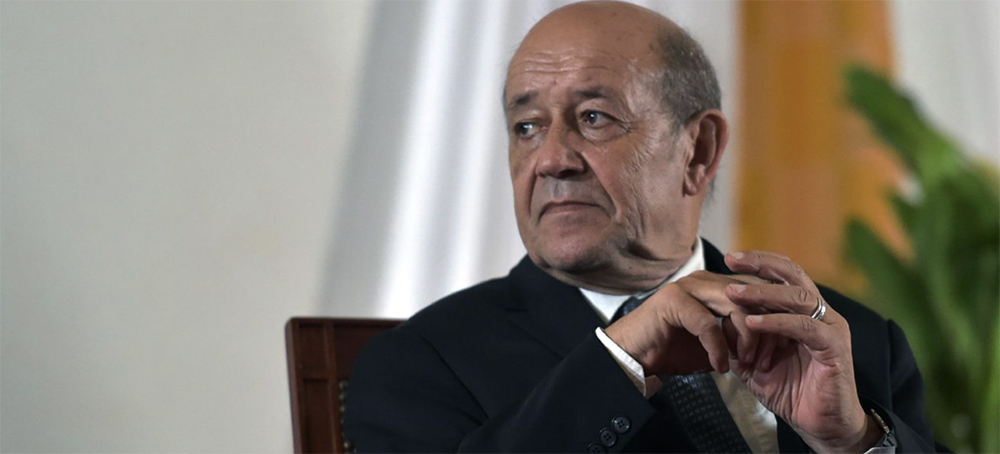 Foreign Minister Jean-Yves Le Drian called the decision 'contrary to the spirit and letter of the cooperation between France and Australia.' (photo: Sia Kambou/AFP/Getty Images)
Foreign Minister Jean-Yves Le Drian called the decision 'contrary to the spirit and letter of the cooperation between France and Australia.' (photo: Sia Kambou/AFP/Getty Images)
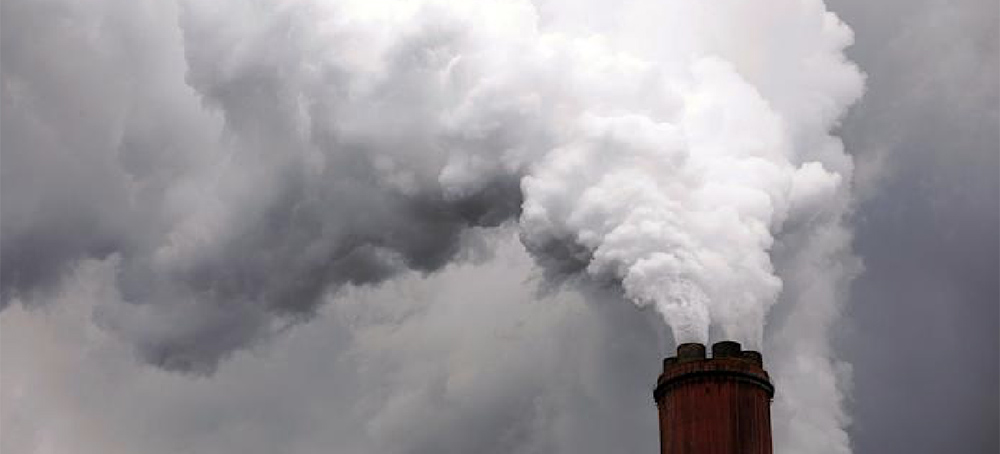 Toxic vapor pours from a chimney at a power plant in Belchatow, Poland. (photo: Piotr Malecki/Bloomberg/Getty Images)
Toxic vapor pours from a chimney at a power plant in Belchatow, Poland. (photo: Piotr Malecki/Bloomberg/Getty Images)
The report's key message is that global warming is occurring more rapidly, and with more quickly worsening effects, than most past models had predicted. Within the next five years, there is a 40 percent chance that the world may breach the threshold of 1.5 degrees Celsius of warming previously identified by scientists and world governments as the hoped-for limit.
“We have reached a tipping point on the need for climate action. The disruption to our climate and our planet is already worse than we thought, and it is moving faster than predicted,” U.N. Secretary-General António Guterres said in a video message that accompanied the release of the report. “This report shows just how far off course we are.”
Already, the U.N. reports, “the global average mean surface temperature for the period from 2017–2021 is among the warmest on record, estimated at 1.06 °C to 1.27 °C above pre-industrial (1850–1900) levels.”
The impact — with more frequent and extreme weather events such as heat waves, droughts and hurricanes — is being felt sooner than many expected.
The measures promised by countries at the 2015 U.N. Climate Change Conference in Paris are insufficient, according to the new report and other recent studies by nongovernmental organizations, as they would leave the world on a pathway toward at least 2.7 degrees Celsius of warming by the century’s end.
Moreover, global greenhouse gas emissions keep rising. Carbon dioxide, which is by far the most prevalent greenhouse gas, peaked in 2019 and dropped in 2020 only because of the COVID-19 pandemic. Emissions of other greenhouse gases, such as methane and nitrous oxide, are rapidly increasing, more than past climate models had anticipated.
The report is intended to encourage more ambitious pledges of national action to combat climate change at the U.N. climate conference in Glasgow, Scotland, in November. Heads of state are also appearing at the U.N. General Assembly next week, where climate change is sure to be a major topic of discussion.
But just as important as making those commitments is that governments follow through and implement the policies that will get them to those targets for emissions cuts. As a U.N. summary of the conclusions put it, “Although the increasing number of countries committing to net-zero emission goals is encouraging, to remain feasible and credible, these goals urgently need to be reflected in near-term policy and in significantly more ambitious actions.”
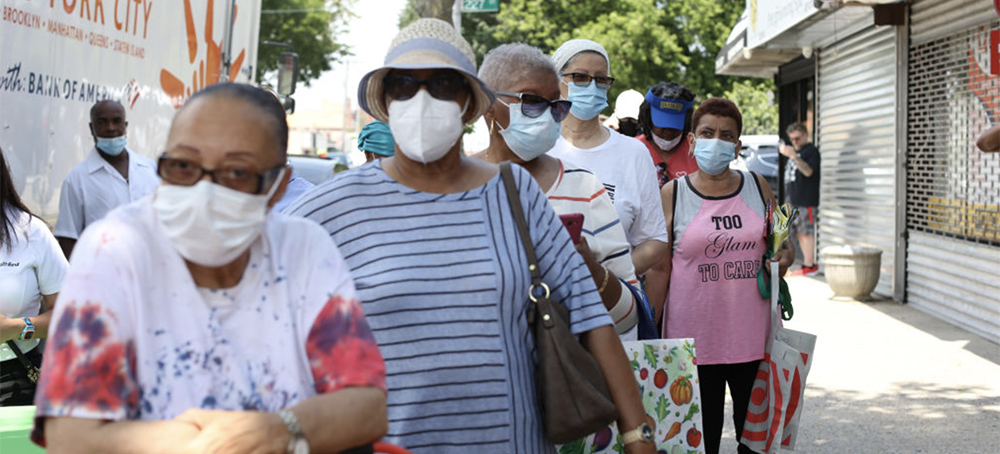 Queens residents line up for a food bank on June 19, 2021, in Cambria Heights, New York. (photo: Bennett Raglin/Getty Images)
Queens residents line up for a food bank on June 19, 2021, in Cambria Heights, New York. (photo: Bennett Raglin/Getty Images)
New numbers from the Census Bureau show that even as the US economy collapsed last year, the poverty rate actually went down. There’s no mystery why: the government gave people money.
In this respect, few societies have managed to innovate quite like the United States, where neo-Victorian social attitudes and myths of moral desert are regularly weaponized against any effort at redistribution. For the political tribunes of wealth, poverty will always be about anything and everything else — inadequate work ethic, the corrosion of the nuclear family, bad personal judgment — and the policy remedies every bit as ethereal.
It’s hard to think of a stronger rebuttal to these mystifications than the stream of data to emerge from the United States’ momentary experiment in mass cash transfers during the COVID-19 pandemic. As per new numbers released this week by the Census Bureau, the share of Americans living in poverty was about 9.1 percent in 2020 — down from nearly 12 percent the previous year, and lower as a share of the general population than at any time since 1967. The context for this drop in poverty was the single biggest economic contraction since the Great Depression: a national calamity that saw the economy hemorrhage millions of jobs. When the same thing occurred during the last recession, poverty rose to 15 percent.
What accounts for this difference isn’t complex or obscure. The Census Bureau estimates that unemployment benefits stopped 5.5 million people from falling into poverty, while direct cash payments lifted nearly 12 million out of it. This doesn’t mean, of course, that the pandemic relief measures passed during the Trump and Biden administrations were adequate. Since official definitions of poverty can be incredibly conservative, plenty of struggling people were still far from secure even after receiving their cash benefits.
But the basic point very much stands. As has been the case all along, the best remedy for poverty is simple economic redistribution — either through direct payments or social programs financed with progressive taxation. The problem is that poverty will always be useful to those at the commanding heights of economic power, a reality made all too clear by the recent — and successful — big business campaign against unemployment benefits.
For precisely this reason, eliminating economic deprivation is difficult — but it’s anything but complicated.
"Outside the street's on fire in a real death waltz between what's flesh and what's fantasy And the poets down here don't write nothing at all, they just stand back and let it all be And in the quick of the night they reach for their moment and try to make an honest stand But they wind up wounded, not even dead, tonight in Jungleland"
- Bruce Springsteen and the E Street Band_
Lyrics Bruce Springsteen and the E Street Band, Jungleland.
Written by Bruce Springsteen.
From the 1975 album Born to Run.
The rangers had a homecoming in Harlem late last night
And the Magic Rat drove his sleek machine over the Jersey state line
Barefoot girl sitting on the hood of a Dodge drinking warm beer in the soft summer rain
The Rat pulls into town rolls up his pants, together they take a stab at romance and disappear down Flamingo Lane
Well the Maximum Lawman run down Flamingo chasing the Rat and the barefoot girl
And the kids 'round here look just like shadows, always quiet, holding hands
From the churches to the jails tonight all is silence in the world
As we take our stand down in Jungleland
The midnight gang's assembled and picked a rendezvous for the night
They'll meet 'neath that giant Exxon sign that brings this fair city light
Man, there's an opera out on the Turnpike, there's a ballet being fought out in the alley
Until the local cops, Cherry Tops, rips this holy night
The street's alive as secret debts are paid, contacts made, they vanished unseen
Kids flash guitars just like switch-blades hustling for the record machine
The hungry and the hunted explode into rock and roll bands
They faced off against each other out in the street down in Jungleland
In the parking lot the visionaries dress in the latest rage
Inside the backstreet girls are dancing to the records that the deejay plays
Lonely-hearted lovers struggle in dark corners desperate as the night moves on
Just one look and a whisper, they're gone
Beneath the city two hearts beat, soul engines running through a night so tender
In a bedroom locked, in whispers of soft refusal and then surrender
In the tunnels uptown, the Rat's own dream guns him down as shots echo down them hallways in the night
No one watches when the ambulance pulls away or as the girl shuts out the bedroom light
Outside the street's on fire in a real death waltz between what's flesh and what's fantasy
And the poets down here don't write nothing at all, they just stand back and let it all be
And in the quick of the night they reach for their moment and try to make an honest stand
But they wind up wounded, not even dead, tonight in Jungleland
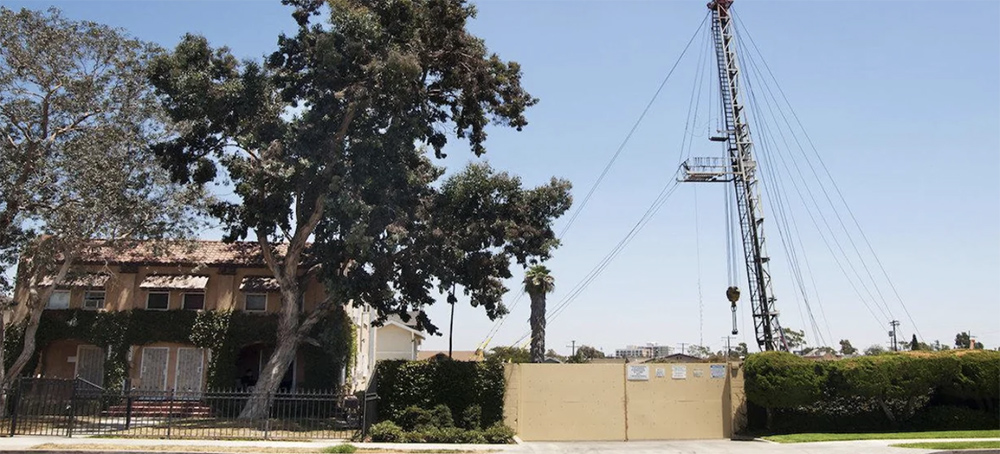 A house in Los Angeles next to an oil drilling site. (photo: Sarah Craig/Faces of Fracking)
A house in Los Angeles next to an oil drilling site. (photo: Sarah Craig/Faces of Fracking)
There are currently 1,046 active wells, 637 idle wells, and 2,731 abandoned wells in unincorporated areas of the nation's most populous county. according to a memo to the board dated June 3, 2021. County Supervisor Janice Hahn praised the plan as "a framework for how we transition from dirty fossil fuels to clean energy and make sure we bring our labor partners with us."
The Board also voted to create a program to ensure that wells are properly closed and cleaned up, and to expand the county's task force focused on a just transition for fossil fuel workers and communities.
As reported by The Associated Press:
Among the sites is the Inglewood Oil Field, one of the largest U.S. urban oil fields. The sprawling, 1,000-acre (405-hectare) site, owned and operated by Sentinel Peak Resources, contains over half the oil and gas wells in the county's unincorporated areas. The field produced 2.5 million to 3.1 million barrels of oil a year over the past decade, according to the company.
"The goal is to provide direction to county departments to begin addressing the variety of issues, environmental and climate impacts created by these active and inactive oil and gas wells," said Supervisor Holly J. Mitchell, who represents the district where most of the Inglewood Oil Field is located.
Mitchell, along with Supervisor Sheila Kuehl, made the motion to phase out drilling in the county's unincorporated areas.
Inglewood Oil Field is adjacent to several Black communities, including Baldwin Hills, Ladera Heights and View Park, where residents have worried about the field's impact on their health and the local environment for at least a decade. Residents have complained of foul odors from the wells and say they have seen oil bubbling through sidewalk cracks in their neighborhoods.
"There are tens of thousands of people who live in very close proximity to oil wells, 73% of whom are people of color," Mitchell said in an interview before the vote. "So, for me, it really is an equity issue."
Follow us on facebook and twitter!
PO Box 2043 / Citrus Heights, CA 95611

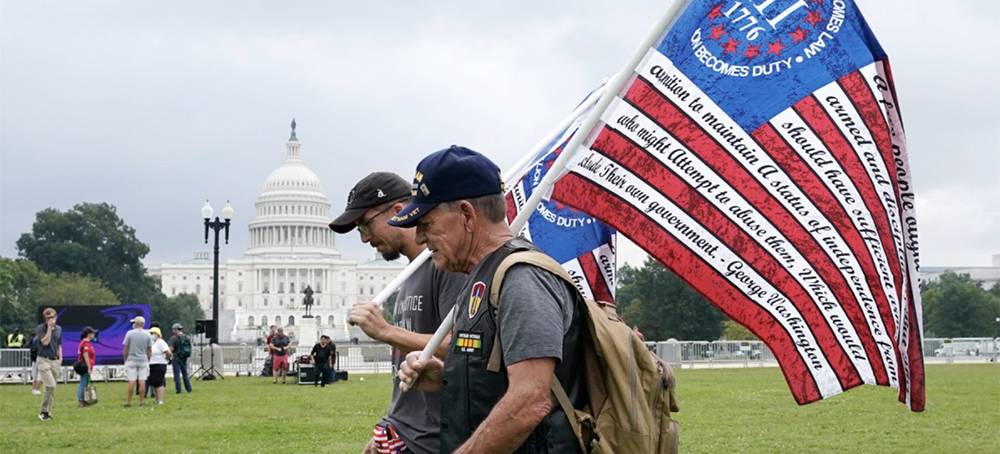

No comments:
Post a Comment